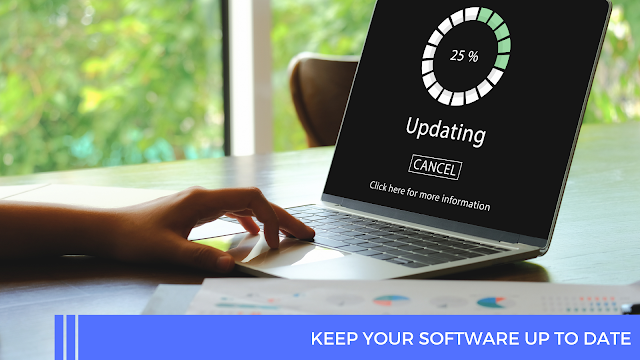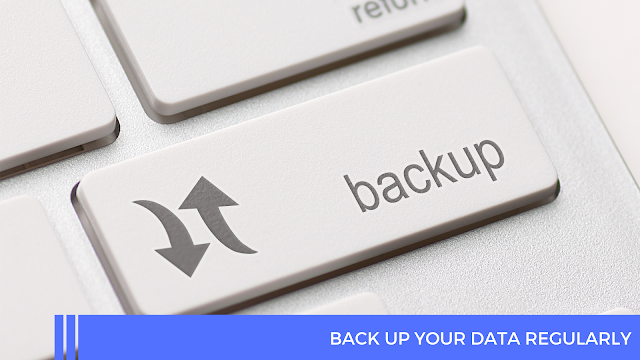
Working from home has become increasingly common in recent years, and laptops have become an essential tool for remote workers. However, just like any other piece of technology, laptops require regular maintenance and care to keep them running smoothly and extend their lifespan.
In this blog post, we'll provide some tips for caring for your laptop when working from home. By following these simple steps, you can keep your laptop in good condition and avoid common issues that can arise when working remotely.

Keep your laptop clean and free of dust and debris
Over time, your laptop can accumulate dust and other particles, which can interfere with its performance and cause it to overheat. To prevent this, it's important to regularly clean your laptop, both inside and out.
To clean the outside of your laptop, use a soft, microfiber cloth to gently remove any dirt or debris. Avoid using cleaning solutions or abrasive materials, as these can damage the surface of your laptop.
To clean the inside of your laptop, you'll need to open the case and carefully remove any dust and debris that has accumulated. To do this, you'll need a can of compressed air, which you can use to blow out any dust and debris from the inside of your laptop. Be careful not to touch any of the components inside your laptop, and avoid using a vacuum cleaner, as the strong suction can damage delicate parts.

Protect your laptop from physical damage
Laptops are portable devices, which means they're more likely to be dropped, bumped, or otherwise damaged than desktop computers. To protect your laptop from physical damage, it's important to use a carrying case or protective sleeve whenever you're transporting it.
A carrying case or sleeve can help cushion your laptop from impacts and prevent scratches and other damage. Look for a case or sleeve that's designed specifically for your laptop model, as this will provide the best protection.
In addition to using a carrying case or protective sleeve, it's also important to handle your laptop with care. Avoid placing heavy objects on top of your laptop, and avoid exposing it to extreme temperatures or moisture.

Keep your software up to date
Just like any other computer, your laptop relies on software to function properly. This software includes the operating system, as well as any applications you use on your laptop.
To keep your laptop running smoothly, it's important to regularly update the software on your laptop. This means installing the latest updates for your operating system, as well as for any applications you use.
Updating your software can provide several benefits, such as improved performance, security enhancements, and new features. In some cases, updates can even fix bugs or other issues that may be affecting your laptop.
To update the software on your laptop, you'll need to check for updates on a regular basis. In most cases, your laptop will alert you when updates are available, but you can also check for updates manually.
To check for updates on a Windows laptop, open the Start menu and click on the Settings icon. From here, click on Update & Security, and then click on Check for updates. This will check for any available updates and prompt you to install them.
To check for updates on a Mac, open the App Store app on your laptop. From here, click on the Updates tab, and then click on Update All to install any available updates.

Back up your data regularly.
Laptops are vulnerable to data loss, just like any other computer. This can happen for a variety of reasons, such as physical damage, software issues, or malware attacks.
To protect your data, it's important to regularly back it up. This means creating a copy of your important files and storing them in a safe location, such as an external hard drive or a cloud-based storage service.
Backing up your data can help you recover your files in the event of a disaster, such as a hardware failure or a ransomware attack. It can also help you avoid losing important files if your laptop is lost or stolen.
To back up your data, you'll need an external hard drive or a cloud-based storage service. An external hard drive is a physical device that you can connect to your laptop, and it provides a place to store your files. A cloud-based storage service, on the other hand, lets you store your files online, so you can access them from any device with an internet connection.
Once you have a storage device or service, you'll need to create a backup of your files. This can typically be done using the backup software that comes with your operating system. For example, on a Windows laptop, you can use the Backup and Restore tool to create a backup of your files. On a Mac, you can use Time Machine to create a backup of your files.
It's important to create regular backups of your data, as this will ensure that you always have a recent copy of your files in case of an emergency. You should aim to create a new backup at least once a week, or more often if you have important files that you update frequently.
In conclusion, caring for your laptop when working from home is important for maintaining its performance and extending its lifespan. By following these simple tips, you can keep your laptop clean, protected, and up-to-date, and ensure that your data is backed up and safe. By taking good care of your laptop, you can ensure that it continues to support your remote work needs for years to come.
Comments
Post a Comment